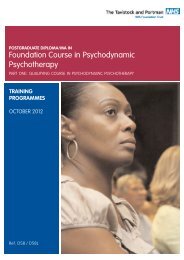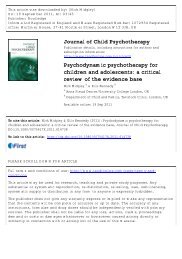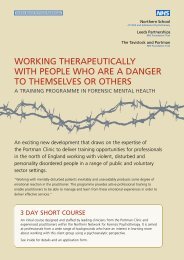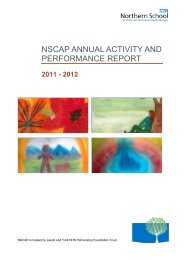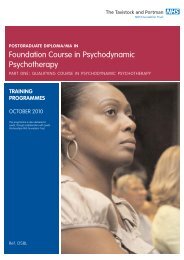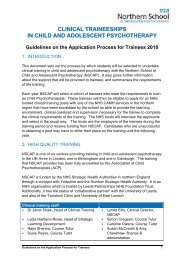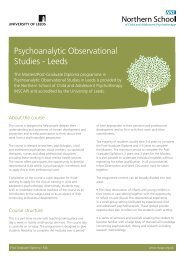D58 Course Outline.qxp - Northern School of Child and Adolescent ...
D58 Course Outline.qxp - Northern School of Child and Adolescent ...
D58 Course Outline.qxp - Northern School of Child and Adolescent ...
- No tags were found...
You also want an ePaper? Increase the reach of your titles
YUMPU automatically turns print PDFs into web optimized ePapers that Google loves.
A. Pr<strong>of</strong>essional<br />
Applicants are invited from the disciplines <strong>of</strong> psychology,<br />
social work <strong>and</strong> medicine, (both from general practice <strong>and</strong><br />
psychiatry), as well as those working as nurses, probation<br />
<strong>of</strong>ficers, art therapists <strong>and</strong> workers from the voluntary<br />
sector.<br />
Applicants are generally, expected to be working within a<br />
core pr<strong>of</strong>ession in the NHS or related organisations.<br />
Students should be in a position to treat at least one<br />
patient in once-weekly psychotherapy for two years.<br />
Occasionally an applicant may not have an appropriate<br />
clinical setting within which the work for this course can<br />
be conducted. Under these circumstances, the applicant is<br />
advised to discuss this situation well in advance with the<br />
course staff, so that we may be able to consider how to<br />
help find an alternative suitable setting in which to see a<br />
patient.<br />
B. Personal<br />
Applicants are required to be in a minimum <strong>of</strong><br />
once-weekly personal psychoanalytic psychotherapy, with<br />
a psychoanalytic psychotherapist registered with the British<br />
Psychoanalytic Council to practice with adults. Personal<br />
psychotherapy is a core component <strong>of</strong> the students<br />
personal <strong>and</strong> pr<strong>of</strong>essional development. Therefore, more<br />
intensive personal psychotherapy or psychoanalysis is<br />
recommended as this enhances the student’s learning<br />
experience.<br />
Students who have not already embarked on personal<br />
psychotherapy are advised to discuss this issue well in<br />
advance with the course organiser so that a suitable<br />
psychotherapy vacancy can be found.<br />
C. Interviews<br />
Personal interviews take place from January onwards prior<br />
to the autumn term intake. Early application is advised.<br />
Applications are accepted on the basis <strong>of</strong> the application<br />
form, interview <strong>and</strong> references.<br />
<strong>Course</strong> Structure<br />
Years 1 <strong>and</strong> 2<br />
The core component <strong>of</strong> the course is the supervised<br />
treatment <strong>of</strong> an adult patient in once weekly<br />
psychoanalytic psychotherapy in a suitable NHS<br />
psychotherapy setting for a period <strong>of</strong> two years. The<br />
taught components take place weekly on a Wednesday<br />
over three academic terms <strong>of</strong> Year 1 <strong>and</strong> 2, with a fixed<br />
programme <strong>of</strong> lectures <strong>and</strong> seminars between 11.15 to<br />
4.45pm (it may be possible to begin at 12.30 <strong>and</strong> finish<br />
at 6.30).<br />
requirements to be completed in this one day. Students<br />
should be prepared to find time on other days to attend<br />
their own personal psychotherapy, to see their patient or<br />
to attend meetings in their clinical placement (if this is not<br />
their usual work setting). Students will also be expected to<br />
see their patients <strong>and</strong> attend their own therapy outside<br />
academic term times.<br />
A. Supervision<br />
Supervision groups take place weekly for 1¼ hours over<br />
three terms each year. A maximum <strong>of</strong> three students meet<br />
with the same supervisor to discuss their clinical material in<br />
detail, on a rotational basis. Supervisors are all experienced<br />
clinicians in psychotherapy. The course fee covers the cost<br />
<strong>of</strong> supervisions over the two-year programme. The<br />
supervision task is to look at the detail <strong>of</strong> the individual<br />
cases from a psychoanalytic view, <strong>and</strong> to advise on<br />
management issues as they arise.<br />
B. Clinical Seminar<br />
Weekly clinical seminars last for 1¼ hours, for three terms<br />
per year. They have a membership <strong>of</strong> up to twelve<br />
students <strong>and</strong> are conducted by an experienced seminar<br />
leader, who continues with the group for one year. Each<br />
student in turn presents their clinical work, <strong>and</strong> the<br />
material is used to develop a wider clinical discussion than<br />
will be possible in the supervision setting.<br />
C. Theory Seminars<br />
A series <strong>of</strong> theory seminars is provided throughout the first<br />
two years. These are presented to the whole year group,<br />
usually about 20 students, by a number <strong>of</strong> different<br />
lecturers, addressing a wide range <strong>of</strong> topics. The style <strong>and</strong><br />
format <strong>of</strong> the seminars varies depending on the subject<br />
<strong>and</strong> individual style <strong>of</strong> each seminar leader; some are more<br />
structured <strong>and</strong> didactic, others approximate more to a<br />
discussion or a reading seminar.<br />
Major basic concepts in psychotherapy <strong>and</strong> psychoanalysis<br />
are covered, <strong>and</strong> reading lists are provided in advance.<br />
D. Workshops<br />
In addition to lectures students are expected to attend<br />
lunchtime workshops three times each term. These<br />
workshops cover a variety <strong>of</strong> issues such as ethics, baby<br />
observation, the experience <strong>of</strong> being on the course <strong>and</strong><br />
clinical skills. They are less formal <strong>and</strong> more interactive<br />
than lectures <strong>and</strong> are led by a number <strong>of</strong> different staff.<br />
Workshops may vary on the Leeds course <strong>and</strong> students<br />
should check details with Leeds staff.<br />
Although the taught part <strong>of</strong> the course takes place on one<br />
day, Wednesday, it may not always be possible for all the<br />
course



